American live poker regulars Art Parmann and Justin Young launched their own YouTube show, Table 1 Podcast, last year.
Table 1 is the former Ivey Room at Aria Casino, home to the most expensive gaming in Las Vegas. One of the first guests was Chino Rheem, a very successful player who became famous in the community, first of all, for his numerous debts.
At the peak of his gambling career, he was famous for the fact that he could take money from backers to buy into a tournament, but immediately leave his winnings at the craps tables. At the same time, he always showed impeccable behavior at the tables and good results. Thanks to his natural charm in finding backers, Rheem never had any problems playing more.
In the podcast, Chino spoke very frankly about some of his gambling adventures, but claims that he recently underwent treatment, and all this is now in the past.
Justin Young: Chino and I have known each other for a very long time, but some of his stories still surprise me. How did you get acquainted with poker?
Chino Rheem: I was 17 years old and my family lived in Florida. There was a small Indian casino called Seminole and I got in using a fake ID that a friend gave me. Naturally, I won’t mention the name.

I really liked it there, I remember the unusual tournaments with a $135 buy-in for Limit Omaha Hi-Lo. They had a strange format – 9 people, freezeout, and only 20 hands. That is, after 20 hands, the game stopped and the prize money was paid according to the stacks – $450, $300 and $175, something like that. The dynamics in them were very interesting. For example, the short stacks in the last hands simply started to win the cap with any hands, because otherwise they had no chance of winning prizes.
Justin Young: You also said that your father taught you to play blackjack.
Chino Rheem: Yes, it was even earlier, even before I started poker.
Casinos on ships were popular back then. My father spent all weekends there. At first I took the day cruise, and if I won, I stayed on the night cruise. It was impossible to play right away because the ship had to go into neutral waters, so we spent some time at the buffet. Then my father would give me a credit card and for the ATM right on the ship, we usually played around $2-4k. He was playing blackjack and I sat next to him and watched. I remember how one day he won $40k and started putting money in his socks, then we got to the car, he hid $20k there, and with the other half we returned to the casino. It is clear that he was a terrible gambling addict and usually left cashless. The apple doesn't fall far from the tree.
Then at the same Seminole, I met Robert Mizrachi. We played $0.50/$1 Limit Holdem with a $20 cap and some absurd rake, almost $5. In one of our first sessions together, we were sitting next to each other and I pulled quads against him. He bet, and he announced a raise, so I moved and for some reason kicked him under the table. I don’t know why I did that, haha. He looked at me in surprise, threw it away, and I showed it the hand. That's how we became friends.
Robert was already a strong player then and immediately realized what a fish I was. I became a regular at their home games and quickly racked up a debt of close to $20,000. Naturally, I didn’t have that kind of money. That's pretty much how my career started.
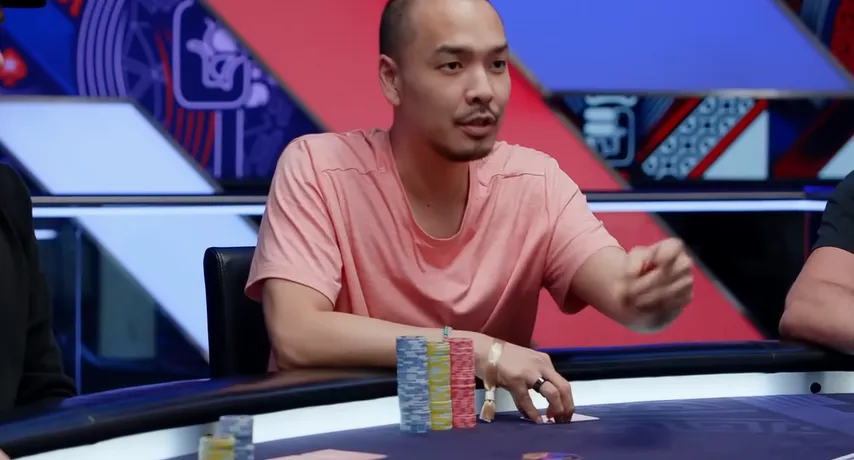
Justin Young: How old were you?
Chino Rheem: 18 or 19, so could already play legally in Florida. I was immediately able to give Robert only $4k, but I was lucky and paid back the rest of the debt quite quickly too. On the same ships, quite large tournaments were held on weekends for $300, the winner received about $20-30k. Robert, Michael, and I went to play one of them and I won straight away.
Art Parmann: This all happened before Moneymaker won?
Chino Rheem: Yes, a long time ago, I think it was 2000. That's right, that means I'm already 20. I graduated from school, went to Germany and came back.
Art Parmann: How did you end up in Germany?
Chino Rheem: After school, my father said that I had two options – go to college or go to Germany to work in a restaurant. The owner was his best friend, with whom he served in the army. I knew him all my life and called him uncle, although we were not related. He opened a sushi restaurant in Frankfurt. I chose Germany, spent six months there and still consider it one of the best decisions in life. I saw the world and even learned a little German.
Before returning to America, another funny story happened that demonstrates what an idiot I am. Before returning home, I asked my father for permission to go to Amsterdam. He agreed on the condition that his wife would go with me. We took the train, and from the station I went straight to the coffee shop.
The variety of offers there made my head spin. “There’s no such thing in America, I’ll become rich,” my 18-year-old brain said. I bought a bunch of weed and seriously planned to resell it at home. I hid everything between coffee beans and somehow stuffed it into my pants; I couldn’t think of a better place. But nothing can cover up the smell of grass. This didn’t bother me, I just got on the plane. Throughout the flight, the woman who was sitting next to me asked: “What is that smell?" I replied that I didn’t understand what she was talking about.
When we landed in Atlanta we had to go down a huge escalator. As soon as I entered it, I immediately saw policemen with dogs below, sniffing the passengers. “I’m done,” I told myself. My father’s wife passed by calmly, but the dogs were clearly interested in me. They didn’t even start barking, and didn’t show any aggression at all, one of them simply buried its nose between my legs. I tried to walk by as if I hadn't noticed anything. “Sorry,” the policeman turned to me. I continued walking, but immediately felt someone’s heavy hand on my shoulder. The dogs gradually began to wind up and behave less calmly. They took me to the inspection room, searched me, and found weed.
One of the dumbest decisions of my life. I was arrested and I spent two weeks in jail, where I was the only Asian.
Justin Young: Just two weeks? Not too bad for transporting drugs across the Atlantic.
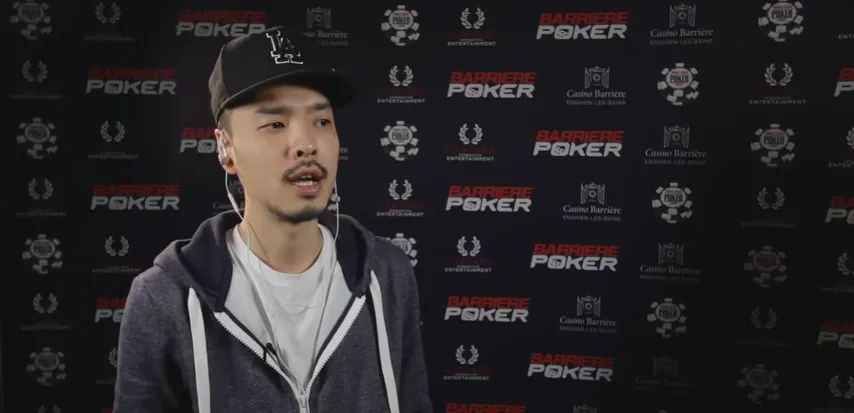
Chino Rheem: Yes, apparently the laws were not so strict back then. But I could have avoided this too. There wasn't much weed; I could have been released altogether after paying a fine of $2,000. But the father’s wife categorically refused to pay, although she had the money. Apparently, she wanted to teach me a lesson. I was furious.
Justin Young: Let's get back to poker. You won that tournament, you paid off your debt to Rob. Is there anything left?
Chino Rheem: Yes, there was some kind of bankroll, that’s where my professional career began. I continued to communicate with Rob and his brothers, went on a series of trips with them. When I turned 21, we immediately went to Vegas. I just won an $11 rebuy on Stars and got about $10k. Naturally, he took all the money with him. Enough money to try your hand at $100/$200 at the Bellagio, right? It worked out great for me and I made it to $20k. Then Rob suggested playing Pai Gow poker. Until that day, I had never even heard of such a game, but since there is poker in the name, there shouldn’t be any difficulties. Moreover, all these events happened before we first reached our rooms. The minimum bet was $25, I allocated $40 for the game. In one of the first hands I get 4 aces and win the $1,000 jackpot. Before I knew it, I already had $12k.
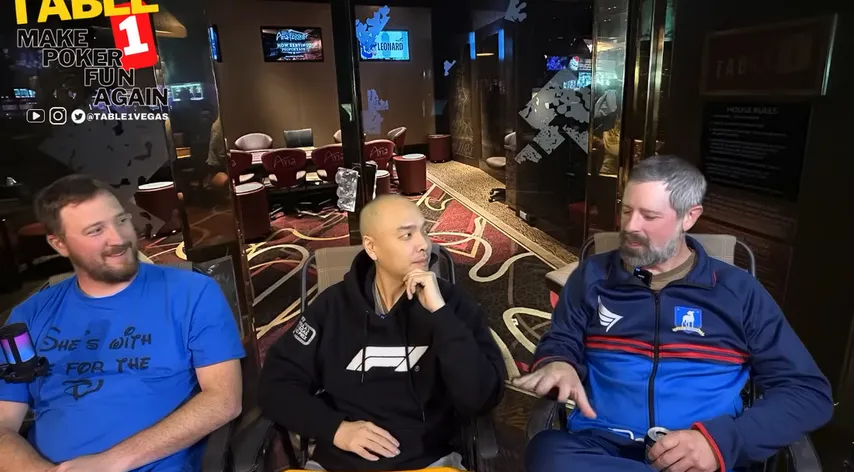
Justin Young: All this with 40 bucks?
Chino Rheem: Yeah. Sounds cool? But perhaps this story was the beginning of my gambling addiction. The pit boss came up to me: “Mr. Rheem, would you like to move into a three-bedroom penthouse with your friends?” I lost a little from the high, but managed to stop and left with a profit of about $100k. We are young, our first time in Vegas, what should we do? Have you ever seen cars with posters with girls and phone numbers? Naturally, we used their services, I paid for everything, and they cost us $2k.
But the casino paid for our food and everything else. They did everything to prevent me from leaving Vegas with money. By some miracle they didn’t manage to rob us, I flew away with $100k in my pocket. But before we had time to take off, I was already dreaming of returning. Three weeks later, Rob and I were back in Vegas. I took $50k, sat down at the table again before reaching the number, and lost everything in 5 hands.
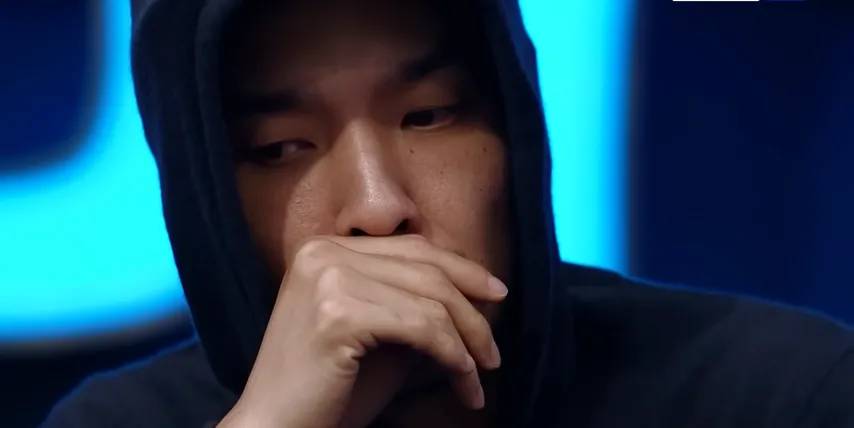
Justin Young: The famous phrase applies perfectly to you – the best feeling in gambling is when you win, and the second best feeling is when you lose. At some point you no longer pay attention to the result, the main thing is the action.
Chino Rheem: That's right. For almost my entire career, I didn’t even realize what a gambler I was. But I don’t regret it, without it I wouldn’t be who I am today. I've been playing professionally for 20 years, 15 of them passed in a blur. I didn't understand what I was doing. I won seven-figure sums, and a week later I was completely in debt. This happened more than once or twice.
Art Parmann: We reviewed your resume before the podcast. You have five winnings over a million and 17 six-figure prizes. Huge amounts.
Chino Rheem: Yes, and I pissed away all that money. I have nothing to hide. The last major win at the PCA was 4 years ago. I received $1.5 million for it. Noah Boeken entered me into the tournament, I played for 50%. My $750k was enough for me for two months. Part of it went to pay off past debts, but I also lost quite a decent amount.
Justin Young: Remember in 2008, you and I split the huge WPT Five Diamond heads-up for $15k? The deal was concluded in a minute right in the toilet.
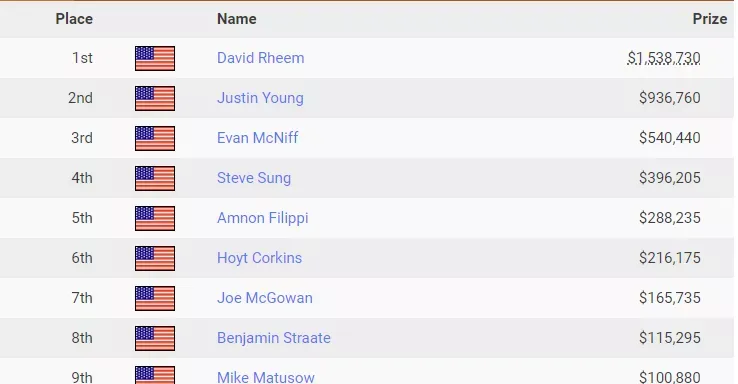
Chino Rheem: I even remember one hand from that tournament, although I usually forget them right away. I 3-bet with , you paid with . The flop came , I just shoved, and you made an instant call and doubled up.
Justin Young: But in hands without showdown, you simply destroyed me. I bet on any flop, but I folded cowardly.
Art Parmann: This tournament was also significant for Justin. Not long before he came to Vegas and tried to become a professional. I got into a game with Bilzerian, where I lost everything and was left with $5k in my pocket. I started grinding inexpensive tournaments and cash games, and reached $100k. Is that pretty much how it was?
Justin Young: Yes, before this tournament I had about $100k. I sold shares and went heads-up.
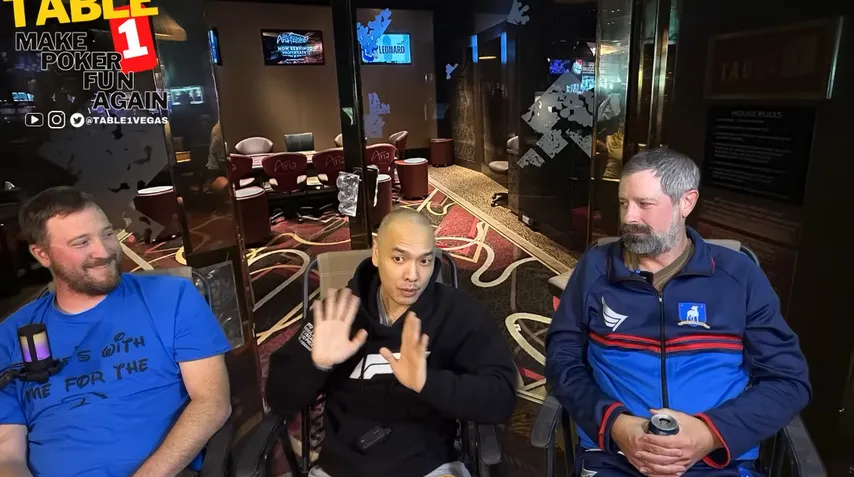
Chino Rheem: Do you remember the terms of the deal?
Justin Young: I think I got about $1.2 million, and you got $1.3 million. I remember that during the same break when we divided, the producers came up to me and said that there would be a ceremonial part after the tournament and asked me not to leave. I had no doubt that I would beat you, so I agreed. But I was so upset about second place that I simply ran away. Now you understand how stupid it was; in any case, I received a lot of money. A few hours later I cooled down, went to dinner with friends and only there I realized that you have to give me about $300k, and I don’t even have your phone number.
Chino Rheem: Yes, but they should have found me right away, it was dangerous to delay it.
Justin Young: I asked Shannon Schorr, who was my shareholder, and other friends if anyone knew your number. No one knew. “I’ll ask Rob sometime later,” I said. My friends laughed nervously at this and advised me not to put it off, haha. But everything ended well, we hadn’t even asked for the bill when you came up to our table and gave all the money with the words “I’ve been looking for you everywhere for an hour.” I remember being shocked and thinking, “What a nice guy. What is everyone saying about him?”
In general, it is amazing how easily players manage such amounts. I doubt that I would trust $300k even to my closest friends who are not involved in gambling.
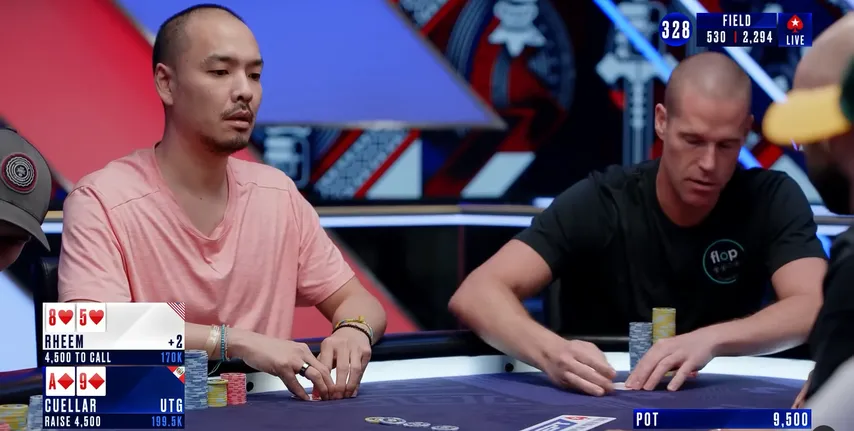
Chino Rheem: I'm glad to hear that, but I'll be honest, you're walking on thin ice. I could just as easily have gone to the craps tables rather than to your place, and you wouldn’t have seen that money for a long time. Moreover, I never had the goal of deceiving anyone or stealing money. I’m not justifying myself, but I honestly admit that almost my entire career I was an absolute gambling addict, which is why I constantly caused problems for myself.
This is a real disease. Since we’ve opened up, I’ll admit that a year ago I underwent a course of treatment at a rehab. I would like to believe that this page of my life is left behind. I recently had a son, and family comes first now.














